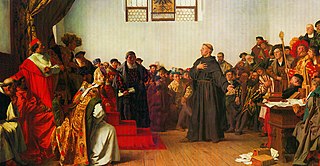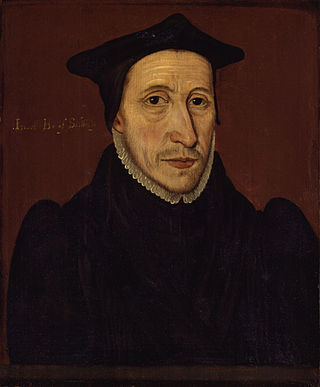On the Councils and the Church (1539) is a treatise on ecclesiology written by Protestant reformer Martin Luther late in life.
On the Councils and the Church is best known for its teaching, in the third part of the book, of the "seven marks of the Church", of which the One Holy Catholic and Apostolic Church can be recognized. These marks are:
Luther's Works: vol. 41

In Western Christian theology, grace is created by God who gives it as help to one because God desires one to have it, not necessarily because of anything one has done to earn it. It is understood by Western Christians to be a spontaneous gift from God to people – "generous, free and totally unexpected and undeserved" – that takes the form of divine favor, love, clemency, and a share in the divine life of God. In the Eastern Orthodox Church, grace is the uncreated Energies of God. Among Eastern Christians generally, grace is considered to be the partaking of the Divine Nature described in 2 Peter 1:4 and grace is the working of God himself, not a created substance of any kind that can be treated like a commodity.

The Diet of Worms of 1521 was an imperial diet of the Holy Roman Empire called by Emperor Charles V and conducted in the Imperial Free City of Worms. Martin Luther was summoned to the Diet in order to renounce or reaffirm his views in response to a Papal bull of Pope Leo X. In answer to questioning, he defended these views and refused to recant them. At the end of the Diet, the Emperor issued the Edict of Worms, a decree which condemned Luther as "a notorious heretic" and banned citizens of the Empire from propagating his ideas. Although the Protestant Reformation is usually considered to have begun in 1517, the edict signals the first overt schism.

Confession, in many religions, is the acknowledgment of one's wrong thoughts and actions (sins). This may occur directly to a god, to fellow people, or to a person acting as a mediator for a god.

Penance is any act or a set of actions done out of repentance for sins committed, as well as an alternate name for the Catholic, Lutheran, Eastern Orthodox, and Oriental Orthodox sacrament of Reconciliation or Confession. It also plays a part in confession among Anglicans and Methodists, in which it is a rite, as well as among other Protestants. The word penance derives from Old French and Latin paenitentia, both of which derive from the same root meaning repentance, the desire to be forgiven. Penance and repentance, similar in their derivation and original sense, have come to symbolize conflicting views of the essence of repentance, arising from the controversy as to the respective merits of "faith" and "good works". Word derivations occur in many languages.
The five solae of the Protestant Reformation are a foundational set of Christian theological principles held by theologians and clergy to be central to the doctrines of justification and salvation as taught by the Calvinism and Lutheranism branches of Protestantism, as well as in some sects of Pentecostalism. Each sola represents a key belief in these Protestant traditions in contradistinction to the theological doctrine of the Catholic Church, although they were not assembled as a theological unit until the 20th century. The Reformers are known to have only clearly stated two of the five solae. Even today there are differences as to what constitutes the solae and how many there are, not to mention how to interpret them to reflect the Reformers' beliefs.

In Christian theology, justification is the event or process by which sinners are made or declared to be righteous in the sight of God.
The means of grace in Christian theology are those things through which God gives grace. Just what this grace entails is interpreted in various ways: generally speaking, some see it as God blessing humankind so as to sustain and empower the Christian life; others see it as forgiveness, life, and salvation.
Absolution is a theological term for the forgiveness imparted by ordained Christian priests and experienced by Christian penitents. It is a universal feature of the historic churches of Christendom, although the theology and the practice of absolution vary between denominations.

John Jewel of Devon, England was Bishop of Salisbury from 1559 to 1571.

The term Evangelical Catholic is used in Lutheranism, alongside the term Augsburg Catholic, with those calling themselves Evangelical Catholic Lutherans or Lutherans of Evangelical Catholic churchmanship stressing the catholicity of historic Lutheranism in liturgy, beliefs, practices, and doctrines. Evangelical Catholics teach that Lutheranism at its core "is deeply and fundamentally catholic". The majority of Evangelical Catholic Lutheran clergy and parishes are members of mainstream Lutheran denominations.

In the Catholic Church, liturgy is divine worship, the proclamation of the Gospel, and active charity. Catholic liturgies are broadly categorized as the Latin liturgical rites of the Latin Church and the Eastern Catholic liturgies of the Eastern Catholic Churches.

The Divine Service is a title given to the Eucharistic liturgy as used in the various Lutheran churches. It has its roots in the Pre-Tridentine Mass as revised by Martin Luther in his Formula missae of 1523 and his Deutsche Messe of 1526. It was further developed through the Kirchenordnungen of the sixteenth and seventeenth centuries that followed in Luther's tradition.
Baptismal regeneration is the name given to doctrines held by the Catholic, Eastern Orthodox, Oriental Orthodox, Lutheran, Anglican churches, and other Protestant denominations which maintain that salvation is intimately linked to the act of baptism, without necessarily holding that salvation is impossible apart from it. Etymologically, the term means "being born again" "through baptism" (baptismal). Etymology concerns the origins and root meanings of words, but these "continually change their meaning, … sometimes moving out of any recognisable contact with their origin … It is nowadays generally agreed that current usage determines meaning." While for Reformed theologian Louis Berkhof, "regeneration" and "new birth" are synonymous, Herbert Lockyer treats the two terms as different in meaning in one publication, but in another states that baptism signifies regeneration.
In the Lutheran Church, Confession is the method given by Christ to the Church by which individual men and women may receive the forgiveness of sins; according to the Large Catechism, the "third sacrament" of Holy Absolution is properly viewed as an extension of Holy Baptism.

Lutheranism is a major branch of Protestantism, identifying primarily with the theology of Martin Luther, the 16th-century German monk and reformer whose efforts to reform the theology and practice of the Catholic Church launched the Protestant Reformation. The reaction of the government and church authorities to the international spread of his writings, beginning with the Ninety-five Theses, divided Western Christianity. During the Reformation, Lutheranism became the state religion of numerous states of northern Europe, especially in northern Germany, Scandinavia and the then-Livonian Order. Lutheran clergy became civil servants and the Lutheran churches became part of the state.

The Lutheran sacraments are "sacred acts of divine institution". Lutherans believe that, whenever they are properly administered by the use of the physical component commanded by God along with the divine words of institution, God is, in a way specific to each sacrament, present with the Word and physical component. They teach that God earnestly offers to all who receive the sacrament forgiveness of sins and eternal salvation. They teach that God also works in the recipients to get them to accept these blessings and to increase the assurance of their possession.
The term Protestant ecclesiology refers to the spectrum of teachings held by the Protestant Reformers concerning the nature and mystery of the invisible church that is known in Protestantism as the Christian Church.

There are seven sacraments of the Catholic Church, which according to Catholic theology were instituted by Jesus and entrusted to the Church. Sacraments are visible rites seen as signs and efficacious channels of the grace of God to all those who receive them with the proper disposition.

A sacrament is a Christian rite that is recognized as being particularly important and significant. There are various views on the existence, number and meaning of such rites. Many Christians consider the sacraments to be a visible symbol of the reality of God, as well as a channel for God's grace. Many denominations, including the Catholic, Lutheran, Anglican, Methodist, and Reformed, hold to the definition of sacrament formulated by Augustine of Hippo: an outward sign of an inward grace, that has been instituted by Jesus Christ. Sacraments signify God's grace in a way that is outwardly observable to the participant.

In Reformed theology, baptism is a sacrament signifying the baptized person's union with Christ, or becoming part of Christ and being treated as if they had done everything Christ had. Sacraments, along with preaching of God's word, are means of grace through which God offers Christ to his elect. Sacraments are believed to have their effect through the Holy Spirit, but these effects are only believed to accrue to those who have been predestined to have faith in Christ.